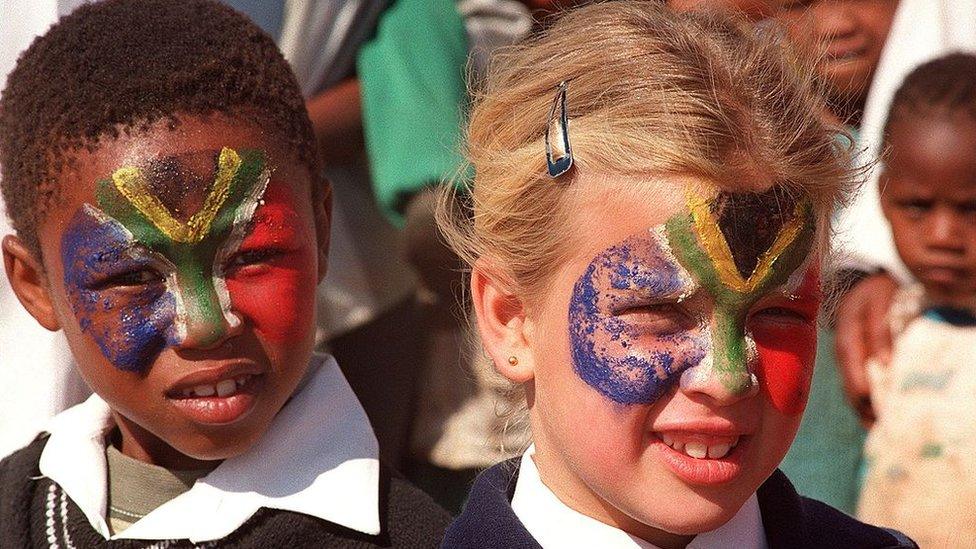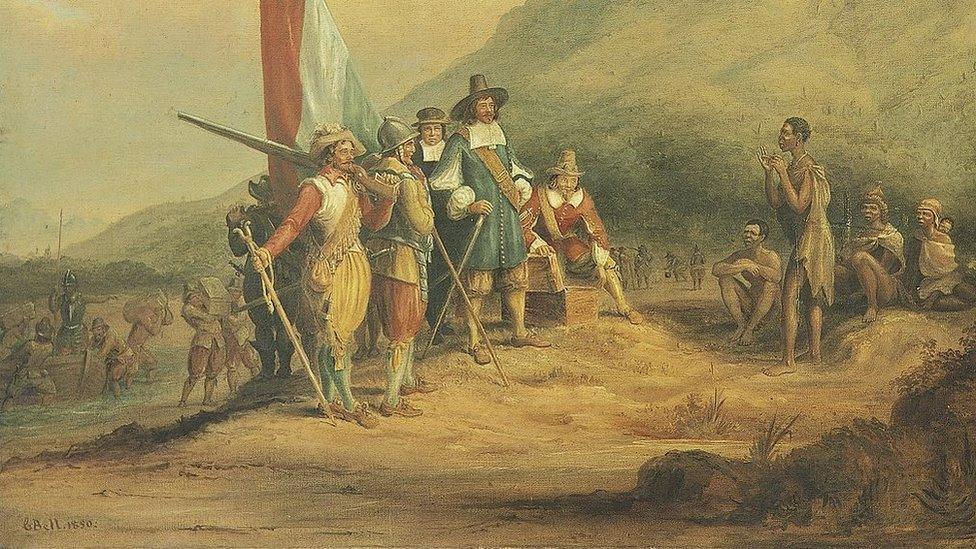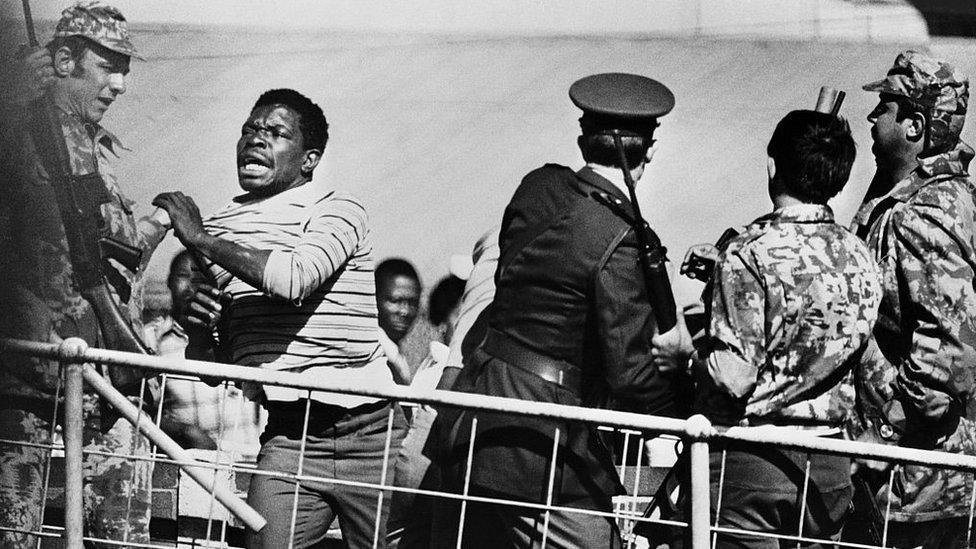Ryanair Afrikaans test: Why South Africa loves and loathes the language
- Published

Ryanair caused controversy last week by insisting that all South African passport holders undergo a test in Afrikaans before boarding its flights to the UK to weed out those travelling with fraudulent documents.
The Irish airline has since backtracked but stoked emotions about South Africa's past, writes BBC London-based radio presenter Audrey Brown, who is South African.

I felt a spitting rage rise in my chest and explode out through my lips into a torrent of words when I read that Ryanair was forcing South African passport holders to take a test - in Afrikaans - to verify that they were indeed South African.
The words I used to express my anger at the crassness of this exercise were mostly Afrikaans words.
I was so angry "Ek kon slange vang" - meaning, I could wrestle snakes with my bare hands.
That's an idiomatic, not a literal, translation of course, but don't you just love that image? It's just one of many vivid ways in which Afrikaans delights those of us who speak it.
I am black, of mixed heritage, from South Africa. As you may have gathered, I speak Afrikaans very well.
For people who know the history of South Africa, this may come as a bit of a surprise. Because Afrikaans was the language white European settlers - 17th Century refugees from the various wars and adventures in Europe - used to cement their identity in Africa.
It helped them establish themselves as a political entity - Afrikaners - the people who first fought and then collaborated with British imperialism to dispossess me and my ancestors of our land.
Ironically, they did that by declaring themselves Africans - "Afrikaner" is Afrikaans for African. But the language that helped them do that is not theirs alone.

The first European settlement in southern Africa was established by the Dutch East India Company in Cape Town in 1652
It was fashioned from the melange of prisoners the Dutch brought to the southern tip of Africa from what is now Malaysia and Indonesia; the enslaved people warehoused in Cape Town, ready for shipping across the Atlantic by the English and the Portuguese; Indian indentured labourers; French Huguenots fleeing religious persecution in Europe; and the indigenous people of what is now South Africa.
Back then in the 1700s it was a highly prized bit of real estate to help European colonisers continue their brutal conquest of the world.
All those groups left their imprint on the language. You would be surprised at how many words in French, Dutch, Yiddish, Flemish, German, Arabic, Hindi, Malay and a good few other languages are contained in the capacious glory that is Afrikaans.
It is one of the world's youngest languages, expressive and agile, a lot like us South Africans even though we don't all embrace it with the same fervent love.
Because when Afrikaans was hijacked to serve the agenda of white supremacists through the policy of apartheid, it was elevated as the language of power and authority, which demeaned and diminished all the other indigenous languages in South Africa.

Black students defied the white-minority regime by protesting against the imposition of Afrikaans on them
The policemen who shot, maimed and killed black children in the Soweto Uprisings in 1976 were following orders that were issued in Afrikaans.
Those children were protesting against inequality in the education system - white children were lavished with money, black children's education was criminally neglected and underfunded.
And the government wanted to force black children to be taught primarily in Afrikaans, which would have isolated them inside a language ghetto, unable to participate in the wider world.
I was teargassed, beaten and arrested by police carrying out those orders, in the waves of protest that finally crushed the apartheid regime, bringing a democratic government to power in 1994.
In all the time we were being brutalised, I still wrote and spoke Afrikaans.
My first job as a journalist was with the pioneering Afrikaans left-wing newspaper Die Vrye Weekblad, meaning The Free Weekly.
I still listened to Afrikaans radio dramas. One of my favourite songs was an Afrikaans one. I still read Afrikaans novels and magazines. I still loved the language.
Millions of my compatriots didn't, don't - and still won't - even if they could. I have just recently started reading Afrikaans novels again.
I love the language but I loathe the fact that it was used to oppress us, that it represents oppression and evokes traumatic memories and experiences"

Today, many still resist learning it because of our hate-filled past. And because of this, my relationship with Afrikaans is complicated.
I love the language but I loathe the fact that it was used to oppress us, that it represents oppression and evokes traumatic memories and experiences.
After a while - a long while - my anger at Ryanair subsided somewhat and gave way to a longing for home - and the word that captures that feeling best for me is not homesickness or nostalgia.
It's the Afrikaans word "heimwee" - mourning or longing for home.
Heimwee. Even the saying of it pushes through my chest with the effort of a breath, whispered through my lips - a soft, saturating ache.
I long to be back among South Africans - to sing and swear in all the languages that we speak.
We now have more than the 11 official ones - of which Afrikaans is just one. And we often combine three or four of those languages in one sentence.
Our languages have given us the ability to adapt and dance, talk and tease with a lyricism that is soul-stirring.

From Our Own Correspondent has insight and analysis from BBC journalists, correspondents and writers from around the world
Listen on iPlayer, get the podcast or listen on the BBC World Service, or on Radio 4

Ryanair has now announced a U-turn. But other airlines could also institute tests in Afrikaans.
So I want everyone to know that a test in Afrikaans - if it is necessary at all - is a form of violence against us.
I could have done it if push came to shove. But millions of South Africans couldn't have - and they should never be forced to.
Which brings me to deeper, more complex emotions. Sadness, shame and disappointment that my country's systems are so compromised that these demeaning tests were deemed necessary.
That our right to move around the world is being challenged because of who we are and where we come from.
For me, it felt like apartheid all over again - to be held in check by a language that was used to try and hold us in check back in the bad old days.
I'm not grateful or happy that Ryanair has dropped the Afrikaans test.
My overwhelming feeling remains anger - anger that they were insensitive and crass enough to force the test on South African passport holders in the first place.
It is an anger so powerful: "Ek kan slange vang" - I can wrestle snakes with my bare hands.

Why Afrikaans is so controversial:
During apartheid, or white-minority rule, Afrikaans was made mandatory, and an official language of education, alongside English, prompting nationwide protests by black South Africans
It is no longer obligatory but is an option in schools
It is the mother tongue of only 13% of South Africans, mainly mixed-race people, known as coloureds, and white South Africans - the descendants of Dutch, German and French settlers who arrived in the 17th Century
More will be able to understand it but many cannot, and speak one of the 11 other official languages
English is the language most commonly used officially and in business, according to South Africa's 2011 census

You may also be interested in:
Soweto uprising: The students who changed South Africa